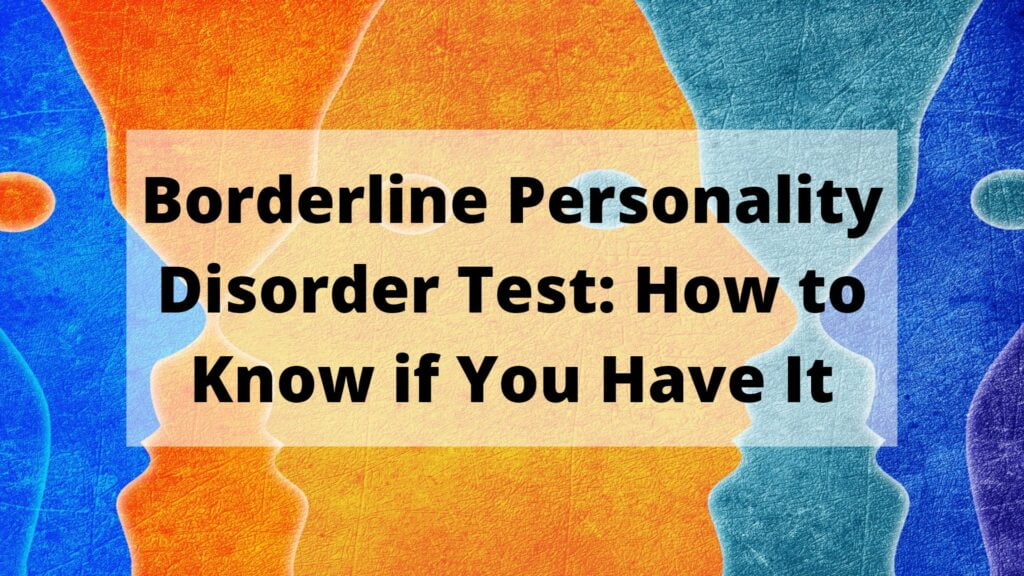Borderline Personality Disorder Test
Borderline Personality Disorder is a mental health condition that affects how you think, feel, and behave. If you are wondering if borderline personality disorder may be an issue for you, take the borderline personality disorder test to find out. This article will provide information on borderline personality disorder symptoms, borderline personality disorder treatment options, and how to get help for borderline personality disorder.
Contents
What Is A Borderline Personality Disorder
A borderline personality disorder is a mental illness that usually begins in the early 20s. It is characterized by strong emotions and impulsive behavior. Borderline personality disorder also makes it difficult to maintain stable relationships with others.
It can be treated, although symptoms may always remain to some degree. Borderline personality disorders can also lead those affected with it towards addiction, self-harm, and also other mental health problems such as anxiety and depression.
Symptoms Of Borderline Personality Disorder
A person suffering from a personality disorder may have trouble feeling good about themselves, connecting to others, and behaving. people with borderline personality disorder share some similar traits as those who have antisocial or narcissistic personality disorders. Moreover, symptoms can range from mild to severe and may include rapid changes in mood, impulsive thoughts, and actions that are harmful to self or others.
Signs and symptoms may include:
- Going to great lengths to avoid being separated from the person after being rejected, or a feeling that someone might leave.
- The pattern of unstable intense relationships, such as idealizing someone one moment and then believing the individual doesn’t care enough or is cruel.
- People with bipolar personality disorder who have been traumatized often feel like they don’t exist or aren’t good enough.
- Periods of stress-related paranoia and disconnection with reality, ranging from a few minutes to a few hours.
- Impulse and risky behaviors, such as gambling, reckless driving, unsafe sex, spending sprees, binge eating or drug abuse, or sabotaging success by quitting a good job or ending a beneficial relationship are examples of this.
- Self-injury, including suicide threats or actions, is a common reaction to feelings of abandonment or rejection.
- Mood fluctuations that last from a few hours to a few days, including euphoria, anger, guilt, or anxiety
- Feelings of emptiness are continuous.
- Excessive, inappropriate rage, such as frequently erupting in fury, being nasty or caustic, or engaging in physical altercations.
Risk Factors Of Borderline Personality Disorder

Three risk factors cause borderline personality disorder, which includes genetics, environment, and brain structure. A borderline personality disorder is often associated with immediate family members that have borderline or other mental disorders.
Environment
Studies show that mothers who are over-controlling influence the development of borderline personality in their children during early childhood years environmental factors like interpersonal relationships play a major role in developing this disease. Therefore, having attachment problems can lead to an individual growing up without proper coping skills for stress management or conflict resolution; one research study shows there is a link between insecure adult attachment styles and borderline personality traits.
Brain structure
When it comes to the brain structure, people diagnosed with borderline tend to have dysfunction in many regions including the limbic system which affects mood regulation leading them into emotional dysregulation resulting in borderline personality traits. Borderline individuals are also known to have a larger right amygdala, among other neurological abnormalities.
Genetics
Genetics is an important factor in whether or not someone has BPD. Studies show that anywhere from 49 to 65 percent of the cause of BPD is hereditary. Experts used to believe that the problem was caused by a poor childhood (something that is still partly true today but not entirely so). Parenting can also play a role, but genetic foundations are more powerful than people realize.
What Is A Borderline Personality Disorder Test
the borderline personality disorder test is an effective tool that helps identify borderline symptoms in adults or children who are at risk for having this mental illness. Therefore this quiz identifies major borderline signs including abandonment fears, identity issues, and mood swings which can help diagnose borderline personality disorder.
Borderline personality disorder test questions ask about how your loved one reacts to change, their emotions and moods, anxiety levels, whether they have issues with drug or alcohol use as well as other mental illnesses such as depression.
What Does Borderline Personality Test Look Like
There is no exact diagnostic test, such as a blood test, that can confirm BPD. People who are worried they might have BPD may take a self-check to explore the possibility. Therefore, to determine if someone has BPD, clinicians conduct a mental health interview that checks for symptoms and commonly known diagnostic criteria. The clinician will typically work toward eliminating any other mental illnesses, including mood disorders, during this mental health examination.
Who Is This Borderline Personality Disorder Quiz For
These questions are about problems that people with borderline personality disorder frequently face. Please read each question carefully and indicate how frequently you’ve experienced the same or comparable difficulties in the last few weeks.
If you’re taking the quiz along with or for someone else, such as a spouse, boyfriend, girlfriend, parent, or child, you should fill in answers that you believe they’d give. Ideally, the loved one will complete the test on their own and after that provide the results to a doctor or registered therapist.
Sample Borderline Personality Test Questions

This confidential borderline personality disorder test may assist you in evaluating your symptoms and therefore it can be used as a guide to determine whether or not you have a border.
It’s important to note that this self-assessment is not a substitute for a formal, clinical diagnosis of BPD. Only a medical expert can correctly diagnose you with a personality problem such as BPD. To determine if you require BPD therapy, talk about your findings with a mental health specialist. The self-assessment questions are not based on the DSM-5’s diagnostic criteria.
Here are some questions for the borderline personality disorder test –
Do you find yourself working hard to avoid being abandoned?
- Yes
- No
Do you usually have trouble with people and find it difficult to maintain relationships?
- Yes
- No
Have you ever had bad self-esteem or self-confidence?
- Yes
- No
Do you have a lack of self-control that may be harmful to yourself or others?
- Yes
- No
Have you engaged in self-injury or attempted suicide?
- Yes
- No
Do you feel really uncomfortable, irritated, or scared frequently?
- Yes
- No
Do you ever feel empty inside?
- Yes
- No
Do you have a hard time keeping your cool?
- Yes
- No
Do you ever feel like other people are watching you or that people are plotting against you?
- Yes
- No
Do you frequently feel cut off or excluded from others?
- Yes
- No
Do you have an aversion to being alone and a desire for others around you?
- Yes
- No
Do you think that people in your relationships are not concerned enough about you?
- Yes
- No
Procedure Of Borderline Personality Disorder Test
To take the borderline quiz, Firstly, you will need paper and a pen/pencil first thing. Secondly, you must do is read each question carefully then rate how much it applies to your life. Lastly, answer the question accordingly.
This self-assessment test will take only five minutes to conduct.
However, the purpose of this test is not to diagnose you. Only qualified mental health professionals can assess whether or how severe your mental illness is.
Results and Interpretation
If you responded to more than half questions as yes then you might have a chance that you have a borderline personality disorder. To further corroborate these findings, you will need to see a psychologist.
If you think you might have BPD, speak with your doctor immediately. However, if you’re at a moderate to high risk, you may have got or are already suffering from Borderline Personality Disorder. To ensure your long-term mental health and safety, In addition, seek professional help to receive an official diagnosis.
If your results indicate a low or moderate probability of being in impact by Borderline Personality Disorder, you are probably not presently suffering from it. This doesn’t imply that the condition could not be developed in the future or that you might have a different mental health problem with comparable symptoms.
Treatment For Borderline Personality Disorder

Here are some treatment options for borderline personality disorder –
- Make an appointment with a mental health professional to receive a formal diagnosis. Even if you don’t have a mental illness now, meeting with a qualified mental health expert can help you manage your symptoms and avoid additional physical and emotional problems. Moreover, your mental health necessitates the attention of a specialist.
- Educate yourself about Borderline Personality Disorder. The more you understand the problem, the better equipped. Therefore you’ll be to spot symptoms in yourself or a loved one.
- Keep an eye on your symptoms. Most importantly, keep a close eye on changes in your thoughts, emotions, and physical health, both good and bad. If you become concerned, see your doctor or a certified mental health professional for a mental health evaluation.
- Explore treatment choices. Depending on your specific requirements, medication plans, alternative medicines or talk therapy may be beneficial. However, mental health care may appear to be out of reach, but, it is a long-term investment that can significantly improve your life in the long run. Many insurance providers cover mental health services.
Conclusion
There is a lot of misinformation about borderline personality disorder, but it can be treated. If you or someone you know has been experiencing symptoms such as emotional instability and impulsiveness for more than six months then subsequently, the best thing to do is get an evaluation by a mental health professional.
This may lead to a better understanding of what’s going on and getting treatment if needed. In conclusion, it’s important not only to take care of yourself but most importantly, those around you who love and support you in your life journey.
For more information, please contact MantraCare. Bipolar disorder is a mental illness characterized by extreme shifts in mood, energy, and activity levels. If you have any queries regarding Online Bipolar Disorder Counseling experienced therapists at MantraCare can help: Book a trial Bipolar Disorder therapy session


